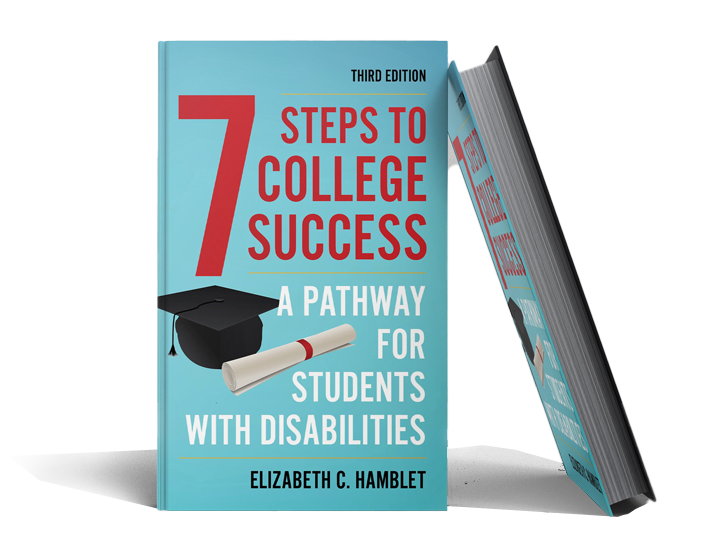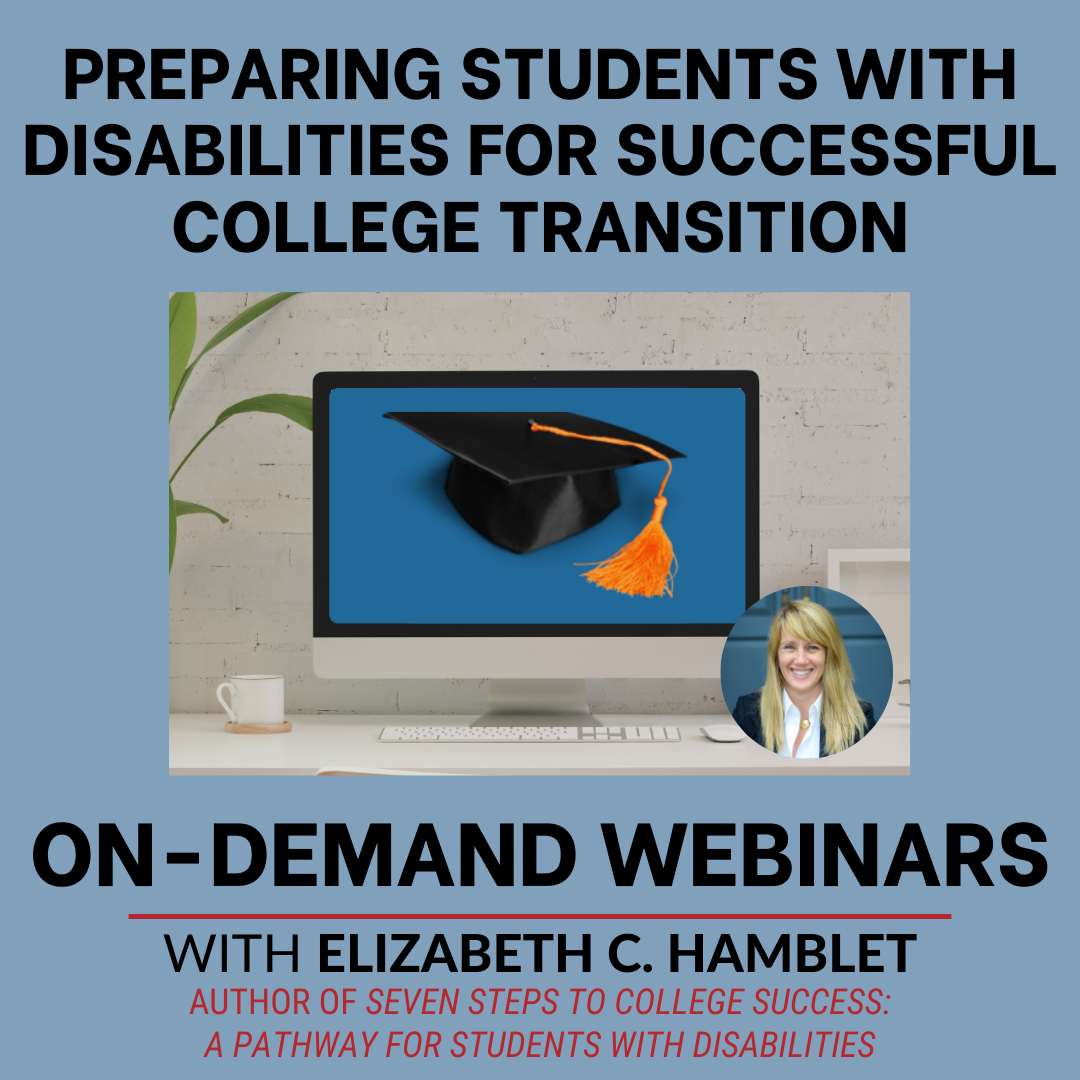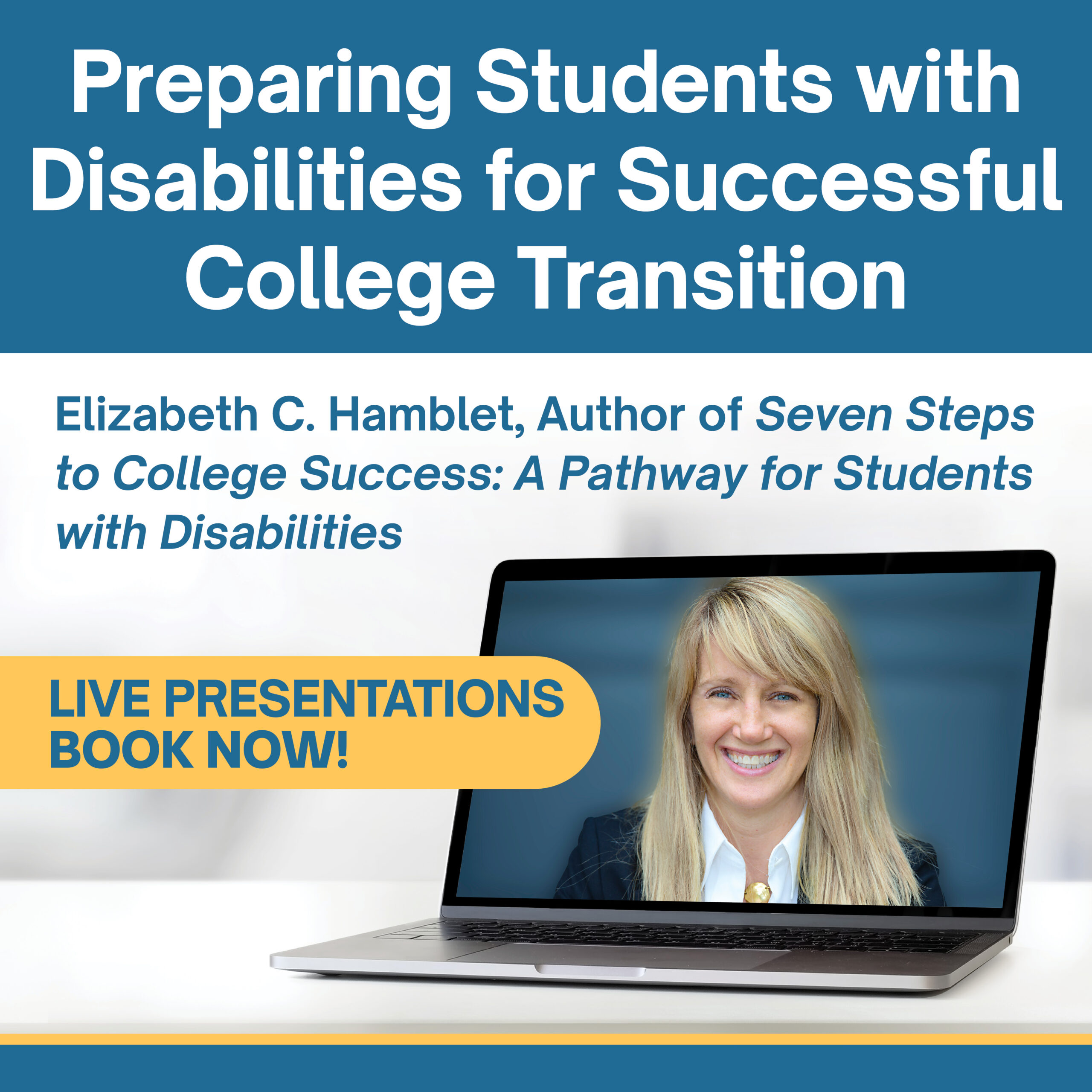Introduction
When students with disabilities transition to college, they’ll need self-knowledge in order to register for accommodations, figure out how to study and work effectively, and seek help (when needed). Unfortunately, the research shows that not all students know enough about their disability to do these things. One study revealed the reason some students lacked this knowledge – no one spoke to them directly and meaningfully about it. *
In an episode of her Tilt Parenting podcast, Deborah Reber (author of Differently Wired: A Parent’s Guide to Raising an Atypical Child with Confidence and Hope) shared her approach to speaking with her own student, and she used the word transparency. I think transparency is an apt word to describe the kind of realistic picture everyone involved in students’ postsecondary transition planning needs in order to determine what they’re ready for after high school – whether they start a job or seek more education. Since college transition is the focus of my work, I see several places where this theme of transparency is relevant.
How Language Choices Can Interfere with Transparency
In the episode that sparked this post, Reber spoke about transitions in her family’s life, including shifts they’ve made in her student’s educational environment. Reber herself uses the term “differently wired” to describe her student and others. Even so, Reber’s view was that parents need to be transparent with their student about their disability and how they see it affecting them as they explain why they are making particular choices about their education.
Some people use “learning differences” or “neurodiversity” as positive framing – pointing out that we all have a unique profile of strengths and weaknesses. This point is spot-on. And no student should be made to feel less-than.
But the laws in place at the college level provide protections only for those with disabilities. If students don’t think they have a disability, they likely won’t register for the accommodations that are available to them. (This was seen in a large-scale study.**)
Conversations must be conducted with sensitivity and with an emphasis on strengths. But declining to discuss a student’s disability with them may mean depriving them of terminology and self-knowledge they’ll need, since they’ll have to initiate the registration process with the disability services office.
Additionally, it can empower them. While a frank understanding of their learning disability won’t be positive for all students, it can be helpful to some, who may decide to seek out the supports available to them before they struggle. Here’s a quote from a student interviewed for a study. They hadn’t registered for accommodations until their third term at college:
I wish it had all been made a lot clearer to me before I started…By the time I finished my [General Education] courses, I’d finally figured out what I was good at and what I stunk at…When I went to ODS, [name] was able to help me understand my strengths as well as my weaknesses, and at least I’d go into a class knowing where the problems were and having a few tricks up my sleeve to deal with them.
All students will have to do things at college that are hard for them – this applies to students with disabilities and their neurotypical peers alike. Before they transition there, they need to be aware of the kinds of tasks poses challenges for them and know what kind of strategies they can use to complete required tasks.
School and Outside Supports That Interfere with Transparency
Use of vague language is not the only way transparency can be compromised. It can also be diminished by the well-intended provision of supports that help students achieve success in high school, such as:
- modified assignments and tests (where students meet different requirements than their classmates)
- having teachers email students the homework assignment instead of having students write it down themselves
- having an adult sit down with a student every day and lead them in the process of getting organized, starting and putting away homework, etc.
These are just a few examples of supports students are unlikely to get at college. While these may result in good high school grades, they can get in the way of everyone involved being able to assess how independently students can function, and whether they are prepared for the academic and self-management demands of college.
Even when parents can provide private support for their student at college, there will be hours of the day when students will need to do things on their own. They may struggle if they’ve never had to do this without someone sitting with them and keeping them on task.
Any professional working with a student should be teaching them strategies they can use independently. Eventually, support should be scaled back, so that families and professionals can have an accurate view of what the student is prepared to do when they’re all by themselves at college.
Family Supports that Interfere with Transparency
Parental support can also mask students’ true college readiness. What brought this to mind was another Tilt episode featuring Jessica Lahey, author of The Gift of Failure. In it, Lahey talked about the dangers inherent in parents’ “rescuing” a student when they do things like fail to get completed homework into their backpack so they can submit it the next day.
Lahey didn’t suggest that parents change their own behaviors abruptly, but rather that they work with their student to figure out where the breakdown is occurring, work together on strategies that will allow the student to take ownership of tasks for themselves, and have them experience the logical consequences of not completing those tasks, if that should occur. I think this is important, because parents won’t be able to rescue students once they’re at college, so they need to develop strategies they can use to manage themselves.
Importance of Transparency for Students’ Decision-Making Abilities
When it comes to conversations around a student’s disability, it’s important to express high expectations for what they can do; research shows this can positively influence outcomes.*** But adults also need to provide some perspective on the realities of some of their goals.
Parents of a neurotypical student who didn’t like writing but expressed an interest in studying literature would likely talk to them about the demands of such a program. Parents of students with a disability should provide the same perspective – again – some transparency.
On 2Black Moms and a Mic, co-host Glenda Augustine, an independent educational consultant, discussed a student she worked with who decided to pursue an engineering degree even though they had dyscalculia. Augustine had tried to explain how much math was involved, but the student was determined. It didn’t go well, and the student had to drop out of the program.
Tutoring and attending office hours may help students studying in a field that’s hard for them, and students who are successful are often those who seek help when they need it. But for any student (with or without a disability), there may not be enough support to help them master what they need to in order to get through a particular major.
This means that providing transparency about a student’s disability shouldn’t be left until they are leaving for college, when they’ll be making a lot of decisions on their own. And it can be an ongoing effort once students are in college.
Last Thoughts
I believe that parents always do what they think is best for their student. My goal is not to criticize you if you’re doing some of what’s discussed here. After all, you know your student best – their strengths, their challenges, and their goals for the future. Do whatever makes sense to you.
My aim is to give you some food for thought as your student moves through their high school years. The research offers some data for you to consider as you plan for your student’s future. Whatever they decide to do after high school, though, they’ll need self-knowledge of their strengths and disabilities so they can make decisions and advocate for their needs.
* Lightner, Kirsten L., Deborah Kipps-Vaughan, Timothy Schulte, and Ashton D. Trice. “Reasons University Students with a Learning Disability Wait to Seek Disability Services.” Journal of Postsecondary Education and Disability 25, no. 2 (2012): 159–77.
** Newman, Lynn, Mary Wagner, Anne-Marie Knokey, Camille Marder, Katherine Nagle, Debra Shaver, and Xin Wei, with Renée Cameto, Elidia Contreras, Kate Ferguson, Sarah Greene, and Meredith Schwarting. “The Post–High School Outcomes of Young Adults with Disabilities Up to 8 Years After High School: A Report from the National Longitudinal Transition Study-2 (NLTS2).” National Center for Special Education Research, Institute of Education Sciences (NCSER 2011-3005). Menlo Park, CA: SRI International, 2011.
***Wagner, Mary M., Lynn A. Newman, and Harold S. Javitz. “The Influence of Family Socioeconomic Status on the Post–High School Outcomes of Youth with Disabilities.” Career Development and Transition for Exceptional Individuals, ” 37, no. 1 (2014): 5–17.




